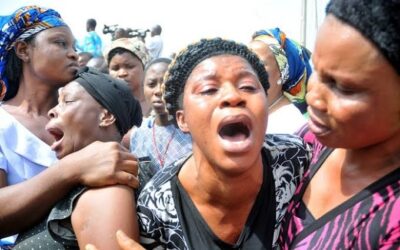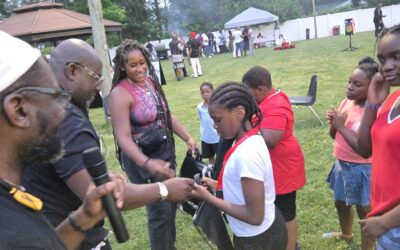Being text of the welcome address delivered by Andrew Obinna Onyearu, NAS Capoon, National Association of Seadogs, at the 2nd Ralph Opara Memorial Lecture, held at Imo Concorde Hotel, Owerri, Imo State, Nigeria on Friday, 4th November, 2004.
The Chairman,
The Special Guest of Honour
Distinguished Ladies and Gentlemen
Ahoy Seadogs
It is my distinct honour and pleasure to welcome you to the second lecture of the Ralph Opara Memorial Lecture Series. The reason that you are all here is because you all fondly remember the man, Ralph Chukwuemeka Opara. One of his most enduring contributions to the development of this country was his participation, in 1952, in the formation of the organisation, the Pyrates Confraternity. With six other young men at the time including Professor Wole Soyinka, they formed the organisation whose key objective was to champion the drive, in the tertiary institution, University College, Ibadan, in the creation of a just and egalitarian society in a period when the kind of societal decadence about which we now complain was becoming quite rife. Their vision, at the time, was to influence the immediate society by giving the highest regards to diligence; honesty and respect in all their endeavours. They led by their actions and although they were only very small in number, their reputation and integrity grew so much that they became a societal barometer against which good virtues were measured. From 1952, this organisation grew in huge proportions. It was exported to other tertiary institutions such that by 1973, it had become a truly national organisation and held its first National Converge in Ibadan. In 1980, we became a registered organisation within the laws of the land as the National Association of Seadogs (NAS). The size of the organisation is such that we now have 33 branches spread across Nigeria, South Africa, Japan, Holland, United Kingdom, Canada and the United States.
NAS has become watchdogs in the Nigerian and international communities, committed to the fighting of all social areas and conformist degradation. We have been irrevocably committed to the emancipation of the downtrodden people of Nigeria and humanity in general. Our philosophy, encapsulated in what we describe as our four compass points, is predicated on resistance and opposition to moribund convention and tribalism. We encourage and support every concept that emphasises humanistic ideals and propagate views and practises that are designed to enhance comradeship and chivalry. It was these various aspirations that Ralph Opara and the six other gentleman who formed this organisation, committed to in 1952. Ralph Opara, an “Original 7”, as we fondly refer to them, remained committed to this organisation until his death in 2002. His loss created a huge void in our organisation, a circumstance we have now come to accept with the humility and equanimity that death usually brings about.
In order to keep his faith alive and to continue to provide a medium to give vent to the views for which he stood steadfastly, throughout his life, we have developed these lecture series. Last year, on 7 September 2004, we held the inaugural lecture here. I welcome, again, those of you who were here. For those making a first appearance, I thank you for the effort.
I think it would be irresponsible not to start by dwelling on the sad events of the last few weeks in the loss of the First Lady, Chief Stella Obasanjo and the Bellview plane crash of 22 October 2005. These incidents brought an overcast of despair and anguish to the nation. I believe it would be apt to set out our thoughts as captured by our comments to Nigerians and the world on 28 October 2005 when we said
“By quirk of unusual coincidence, the Nigerian Nation was thrown into mourning with the loss, on Saturday, 22 October 2005 of 117 persons who died when Belleview Airlines Flight 210 en route Abuja from Lagos, crashed in Ogun State, Nigeria. Literally within hours, the nation lost its First Lady, Mrs Stella Obasanjo. NAS, along with million other Nigerians, joins the President Olusegun Obasanjo and the entire country in expressing our extremely heartfelt sympathies to their families for their huge and tragic losses. The grief experienced by friends and family of those affected has been inexpressible. To the President, we convey our condolences, in the belief that he will find strength, resolve and fortitude to bear his and the nation’s loss. It will be a long time before the nation comes to terms with what has happened. The nation needs to mourn its loss; bury its differences and unite in grief for the sake of the country and for the future. This adversity has tested the very resolve of the country, to its highest possible limits. As a nation, we find ourselves now “against the ropes”. What remains for the nation to consider is its response to these adversities. It is essential that the response is a reflective; carefully diagnosed and proactive one.
Nigeria has been sadly associated with aircraft accidents and fatalities in a manner that has called into question, the role and involvement of those managing the aviation industry in transport in Nigeria. In 1996, 142 people died when a Boeing 727 owned by ADC Airlines crashed 86 kilometres from Lagos. On 4 May 2002, 147 persons lost their lives when an EAS domestic aircraft crashed in Kano. That aircraft was a BAC 1-11-500 in respect of which the then Minister, Dr Kema Chikwe swiftly imposed a ban on its usage. 2005 has been a particularly unpleasant year in relation to airline accidents. Indeed, this year has been the aviation industry and Nigeria’s annus horribilis. On 13 March 2005, a plane crash landed in Abuja Airport. On 4 May 2005, a chartered airline plane skidded off the runway at Abuja Airport. On 11 June 2005, an EAS aircraft crash-landed in Jos. On 9 July 2005, an Air France aircraft with 196 passengers on board ran into stray cows on the runway of Port Harcourt International Airport as it touched down. On 30 June 2005, an aircraft carrying 92 passengers made an emergency landing at the local wing of the Murtala Mohammed Airport, Ikeja, Lagos. Barely 4 months later, the last incident of 22 October 2005 occurred. These, in 2005, were the publicised and documented incidents. The “close shaves” that Nigerians have come to appreciate as “normal” occur with the same regularity as the flights themselves. These remain both undisclosed and concealed.
This historical perspective on aircraft accidents is simply unacceptable. We do not believe that there is anyone who considers these statistics palatable reading and those who do are in the hopeless, depraved minority. The reality is that the aviation industry in Nigeria is in a mess. Aged planes populate the fleet. Airlines are taking risks by the day, undisclosed to innocent passengers and play “Russian Roulette” with the lives of its patrons. Cost and corner- cutting unknown in First World Countries is rife in the industry. Government- run facilities are even more deplorable. Ministerial efforts continue to be defeated by middle-level sabotage. Minimal resources are so poorly distributed that the emphasis is placed on the wrong or undeserving aspects. Regulatory bodies either do not undertake their functions with desired seriousness or allow internationally acceptable standards to be extravagantly compromised by ineptitude and greed.
The alternative, road transport, is even more pathetic. The risk on the road is several times higher. The poor state of the roads, long distances between major administrative and commercial towns and abject lack of security at the hands of villains and the protectors all combine to reduce the viability of road travel as an option for all but the shortest trips.
The Nation’s response is that enough is enough. Government should exact from its agencies and provide to the industry’s patrons, the highest possible compliance with standards. It is plain that errors here have lifelong; life threatening and life loss consequences. Offending airlines should be prevented from flying – period! There should be no compromise. Actions that place the life of Nigerians at risk should attract criminal prosecution and commercial ostracism. The aviation market is a fruitful one for its investors. It is despicable that any short cuts should be permitted. We should accept nothing less and encourage our leadership to ruthlessly eliminate these practices. The loss that we have suffered as a nation to aviation accidents must stop. As human beings, we have to accept that accidents occur. The kind of recklessness that occurs should be despatched with undisguised intolerance. Those responsible for bringing about these situations should no longer be allowed to profit from their worthless indiscretion. As patrons of the aviation industry, they should encourage Nigerians to accept no less. These losses are now one time too many.
NAS notes that the President has directed that special and detailed investigation be conducted; that the International Civil Aviation Organisation (ICAO) and that the manufacturers of the plane and experts should be involved in the investigation. We commend the President for that incisive direction. Without prejudice to the outcome of that investigation, our organisation considers that the problem is significantly more involved than this one investigation can uncover. The Presidential direction and those of the legislature should go significantly further. In our view, decay in the aviation industry is significantly more widespread. Frequent air travellers repeat accounts of sheer incredulous escapes of serious accidents, almost on a daily basis. The average age of aircrafts used in Nigeria is 20. The service on the ground is even more appalling. The Lagos airport, easily the busiest, is reputed to have one runway servicing both international and local flights, the runway itself infected by disturbing disrepair. The other airports, with obviously lesser infrastructural content, have an even more appalling outlook. Ground staff is poorly trained and many of them may never have boarded any of those flights, the consequence of which is that they may never have experienced the anxiety to which passengers are exposed on a daily basis.
Whilst it is correct that airline travel benefits a small majority of the vast Nigerian population, its usage is on the increase. This patronage from Nigerians demands better, safer and more efficient service from the industry. This decay must be arrested. NAS demands a Public Inquiry to which interested Nigerians should be welcome to give evidence. The Inquiry should be headed by a sitting or retired Supreme Court Judge. Only such a public enquiry comprising technical, commercial and legal experts receiving evidence from Nigerians as a whole within a very short period of time can fully ventilate these grave concerns. A public enquiry will give Nigerians an opportunity to air these complaints and the airlines an opportunity to defend themselves. In the interim, we also believe that it is imperative that the regulating authorities commence, without delay, a comprehensive audit of all airlines operational activities against international standards by a process that is comprehensive and transparent. These very unfortunate incidents continue to catch us completely unprepared. It is time we took the prevention process more seriously.”
The subject of this lecture – Democracy and Governance – Rethinking the Nigerian Experience – is one that engenders a reflective appraisal of the journey of the Fourth Republic to date. Last year, at this event, we said
“…The most recent democratic experiment from 1999 has provided the country with an opportunity to build a society in which justice is guaranteed; human dignity sustained and civil liberties are available to all Nigerians. The course of nation building and democratic conciliation ought to have ensured that significant gains are made in the areas of economic, political and social development. We are sure that the lecturer will attempt to analyse the historical and present developments in relation to the democratic experience. We are sure that in the process, he will explain to you where the experiment has succeeded and where it has failed. What is commonly accepted is that Nigerians have demonstrated a significant amount of goodwill and patience towards its government. Nigerians are conscious of the fact that change will not come about overnight and that social change is a complicated process that requires time. Having said that, the fundamental issues that affect Nigerians such as poverty alleviation; resource distribution; development of infrastructure and security remain the subject of considerable anxiety amongst us all.
Since then, a number of key developments have occurred, most notably a significant momentum generated by the anti-corruption drive of the government; Debt reduction concessions secured with the Paris Club of Creditors; better relationship between the Legislature and the Executive, to mention a few. Last year, we also said
“…The Nigerian draws a very strong linkage between better living standards and democratic rule….It is commonly agreed that since the inception of democracy, progress has been made in the area of personal freedom or freedom of expression. What has come about is a new and more open society where people no longer live in fear of the military and feel able to express themselves freely on the various issues regarding their governance. There have been qualified gains elsewhere particularly in the areas of telecommunication. However, the areas of societal life where democratic governance ought to have a direct and significant impact on the populace still leaves a huge feeling of under achievement. Public Institutions have been seriously undermined; Unemployment appears to be growing; insecurity and poverty continues to escalate and the tertiary institutions, the source of our future, still remains very poorly under funded and supported. The failure to tackle these present problems can translate into failure by government in those areas. What Nigerians want, from the experiment, is more than a tangential commitment to improve the areas of societal life that have a more direct effect on them. In practice, what ought to happen is that significant improvements must be made from the situations of today in order to secure the happiness of Nigerians for tomorrow…”
Nigerians appreciate that change must take place for conditions to improve. That open reception must be reciprocated. NAS feels that efforts being made by the highest level of leadership are being systematically undermined by individualised pursuits of personal development and aggrandisement. Only the sobering consequence of EFCC experience has brought about some restraint especially with the 2007 elections looming in the horizon. The effort to sanitise our country for tomorrow must continue, apace.
I apologise for the length of this address. For your patience in listening: your respect for the memory of Ralph Opara; your support for his family and for this organisation by being here today, I express my immense gratitude to you. Ahoy Capoon, your memory and accomplishments in the PC and life will never be forgotten. Thank you very much.
Andrew Obinna Onyearu
NAS Capoon
National Association of Seadogs



